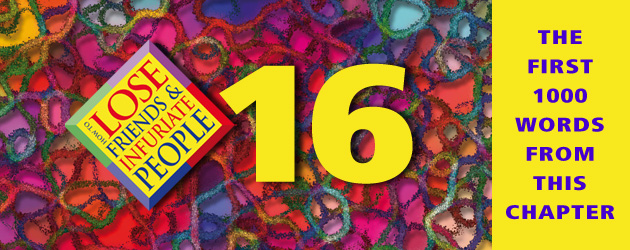 The following are approximately the first 1000 words from Chapter 16 of Jonar Nader’s book,
The following are approximately the first 1000 words from Chapter 16 of Jonar Nader’s book,
How to Lose Friends and Infuriate People.
Ready… aim now… what?
How to hire; when to fire; and what to do in between
I once had the good fortune of working with a self-made millionaire who headed his own international multi-billion-dollar organisation. Despite his complex advice about personnel management, his leading maxim was, ‘Each year, go through every division and flush out the bottom three percent of the staff.’ This cleansing ritual was designed to remove hangers-on who were not contributing to the success of the company.
In thinking about such maxims, I set out to gather the best advice in relation to hiring and firing employees, and getting the most out of them. Here are the top dozen maxims most commonly used in today’s corporate world.
1) Hire slowly, fire quickly.
2) People do what gets measured, so measure it, and it shall be done.
3) These days, workers should be treated like volunteers, not employees.
4) Hire people who can work while unsupervised.
5) Apart from high IQ, be sure to hire people with high emotional intelligence.
6) Teamwork is vital because none of us is as smart as all of us.
7) It is wise to adopt kaizen (continuous improvement).
8) Strive for world’s best practice.
9) People don’t like change.
10) It is important to allow diversity in the workplace.
11) Your people are your greatest asset.
12) Each year, flush out the bottom three percent of your staff.
Apart from minor paraphrasing for the purposes of grammar, these quotes come from the biggest names in the business, and were distilled from a list of over 150. The ranking is not important, other than the fact that my survey participants selected these as their most preferred pearls of wisdom. Participants were asked to rank what they considered to be the twelve most useful pieces of advice for managers who hold responsibility for hiring, firing, or managing employees.
Would such a list be applicable in the networked world? Is good advice ageless and timeless? Are words of wisdom beyond reproach?
It is important to ask these questions because there is something deceptive about wisdom — it is not a cure-all ointment that heals personal and social problems.
Wisdom is not a word that refers to a particular set of advice. It does not point to anything; no more than honesty relates to anything. Honesty is a condition, a value, and a principle. It is refreshed with each situation, and refers to different things at different times. In the same way that one cannot say, ‘Let me give you some honesty’, one cannot say, ‘Let me give you some wisdom’. It is not a matter of pre-packaged solutions. Wisdom is the act of arriving at a decision that one knows will not trigger regret.
This list of twelve internationally recognised gems is, in fact, misleading and harmful. In the networked world, they are useless because wisdom must always be fresh. Anyone who holds these maxims up as useful advice is engaging in the oft-foolish practice of magnetic thinking. (For more information about magnetic thinking, see Chapter 23, ‘Characteristics of the modern world’.)
Each of the items in the list will be explored in more detail to show why the networked world demands fresh wisdom. At the end of each point, I have included my suggestion for the modern version that contributes to success.
I have not set out to prove anyone wrong. I am trying to reveal the new demands of the networked world. Furthermore, the purpose of this chapter is to give twelve examples, not to suggest that there are only twelve important issues facing managers.
Old wisdom #1: Hire slowly, fire quickly.
My colleagues often ask me how a perfectionist like me manages to get so much done. Their first mistake is to assume that a perfectionist must be pedantic. They also assume that good decisions are those that require long bouts of deliberation. My typical response is that I am productive because I make a decision only once. I also make the point that I am not one to be impressed with ‘good decision-makers’. I prefer to work with ‘makers of good decisions’. This eliminates the error rate, and allows me to plough through the day with speed.
The point here is that the advice to hire ‘slowly’ is misplaced. The speed of a good decision is irrelevant. In the networked world, hiring slowly is not at all a useful thing to do. In corporate life, anyone who does not snap up the opportunity to increase the headcount could bet that within thirty days, the rules would have changed, with headquarters putting a freeze on hiring. (Conversely, managers tend to tolerate low performers because if they let someone go during a hiring-freeze, they might not be allowed to replace that person. So they suffer incompetence merely to protect their empire.)
Incidentally, these days, talented and skilled people are being snapped up. If you take too long to make an offer, you’ll find that your candidates would have accepted another offer elsewhere.
As for firing quickly, this too is a mistake. The question of speed pertains to executing your decision once you have made it, not making the decision itself quickly. Firing quickly could not only be unjust and unfair to the employee, it might also be detrimental to your organisation. By firing people without fully understanding why they have performed poorly, you stand to lose the opportunity to pinpoint the bad circuitry. Removing the employee might not equate to removing the problem.
New wisdom #1: Don’t hire if you have the slightest doubt. Fire without the slightest hesitation.



Comments are closed.